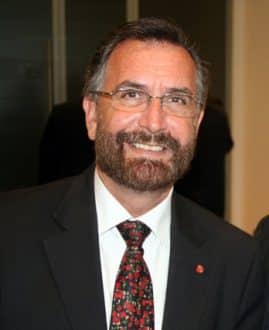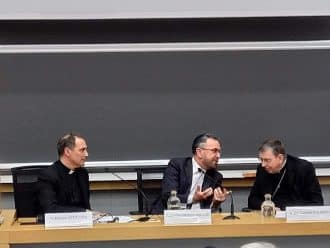Jewish Education and Animal Welfare: Rabbi David Rosen

The following interview was conducted by JES with Rabbi David Rosen, the American Jewish Committee’s International Director of Interreligious Affairs. He served Chief Rabbi of Ireland and as the senior rabbi of the largest Orthodox Jewish congregation in South Africa. He is also a prominent vegan activist and an Honorary President of the International Jewish Vegetarian and Ecology society.
Do you have one thing to say to Rabbis and Rabbinical students on the issue of Animal Welfare?
Often when people ask what I do in the field of interfaith relations, I say that I’m an interpreter because even if I’m speaking English all day or Hebrew all day, I’m speaking to people according to their different mind-sets and different codes and points of reference. And when, in a Jewish community, we need to argue for the importance of a plant-based diet, we have to address different constituencies in different ways. And with all honesty, within the religiously observant community, the appeal to the ideals of animal rights or the ideal of a dietary way of life as a plant-based way of life, are not necessarily going to have the same appeal as arguments that point out the specific desecrations of Jewish teachings involved in animal production today.
Therefore if one is going to argue, particularly in the Orthodox Jewish world, one needs to argue that the actual products today are not truly kosher, not simply in terms of the teleology, the goal of kashrut, but in the production itself. One of these examples is the examination of the internal organs of the animals especially in the dairy industry where, when these are analysed, they are so distorted by the lifestyle, by the conditions, under which these animals are bred that that actually renders them non-kosher. If they are non-kosher, then their products are non-kosher and therefore the milk becomes non-kosher. This is just an illustration to point ways in which one can argue within even the most, if you like, conservative (with a small “c”), segment of our religiously observant community that a plant-based dietary lifestyle is the only one that is consistent with their teachings.

The desecrations involved, internal changes within the animals – in other words, the way that animals are reared – actually changes their inner organs and that leads, therefore, to distortions which are prohibited by Judaism for consumption and even their products are prohibited accordingly. Similarly you can also specifically focus as an effective argument on the issue of Tsaar Baalei Chayim when you are dealing with egg production. No observant Jew is going to think that grinding up baby chicks simply because they are male chicks is permitted by Judaism. And therefore to be party to that, and to show that you are aiding and abetting such desecration, will have certain impact.
So you have to be able to target the argument according to the respective audience. But anybody, especially those who are entering the Rabbinate, who are serving as religious guides, as Rabbis, have a responsibility to educate their communities as to what is exactly taking place that they are party to, what is actually taking place in the production of the products that they are consuming, and to be able to alert them that if there is a kosher certification on a product that, therefore, has come from a process that is illegitimate and immoral, then it is not truly kosher.
Within Rabbinical programs across the spectrum, there is more basar v’chalav (meat and milk) than mention about animal welfare. What’s your message to Deans of Rabbinical schools about how to respond to the issues you are describing?
The question as to why there is not a greater awareness of these aspects within Jewish seminaries and yeshivot – and that this is not an integral part of preparing people for ministry in the community, for leading communities, for guiding the flocks – is a very important question on one level. There are so many issues today which are new – throughout most of history there was not such a barbaric production, there was no ecological crisis, there was no imminent challenge to our survival from climate change… therefore they simply didn’t feature on the religious radar screen, if you like, so in many respects these are new. Generally speaking, the more religiously-devoted communities are, the more conservative they are and, therefore, new things are treated with a degree of suspicion and it takes time before they are able to enter into those communities. So we have a lot of work to do to be able to sensitize that religious leadership to the importance of these aspects.

But there is another dimension, and that is that traditional semicha, Rabbinical ordination, focuses almost exclusively on the laws that relate to the laws of kashrut, of shechita, of ta’arovot, of admixtures, of basar v’chalav, of milk and meat, and their separation and all the aspects that relate to the traditional form of kashrut that involved animal products. Therefore when you come along to argue that a plant-based diet is the only morally legitimate approach today, to some degree there is a perception that you are threatening the very system that is foundational to the authority of Rabbinic tradition. So we have to do so in a manner that is respectful to that authority and find ways to be able to argue the case within that system. That’s not simple, that takes time!
We are the pioneers of this particular age and it will take a while before there is a full awareness of all its ramifications. And of course we might add that in the meantime, the process of human society itself may render this already, somewhat, therefore irrelevant for a variety of reasons. The vegan diet is the diet of tomorrow. It’s just not sustainable for humanity to be able to maintain the forms of consumption of animal products that we are conducting today.
How would you argue with those who say Yeshivot just don’t have time to put this into their curriculum?
For those that argue that there is so much that they have to incorporate in the educational system to train Rabbis and religious guides in the Jewish community – that they can’t add another dimension! – I would say: “you must not see this as another dimension – this is the essence of what you’re trying to teach! You should not be teaching the laws of kashrut without addressing these issues! You should not be teaching halacha without dealing with these issues! These are central to the very core education that you should be transmitting to your students.”

Can religious concern for animal welfare help promote interfaith cooperation? What’s the connection between your advocacy here and can it bring together people from many faiths?
There is always a danger with the human person of what one might call cubicalisation – that one focuses on one area and disregards others. And of course there is a danger even with regard to the dimension of compassion towards animals that people can be fixated on animals and insensitive to human beings. That’s not consistent, of course, with its most noble values and aspirations. Where a human being, however, wants to be sensitive to a human being as well, sensitivity towards animal life can enhance that in an enormous way. So this same manner, the engagement passionately with your environment, with your sentient environment, should enhance your engagement with your human environment and all its constituent components. That means different nations, that means different religious peoples, that means different communities.

Now, from a religious point of view, from a spiritual point of view, the interfaith engagement is something unique. Because you are not just encountering another human being created in the Divine image, you are encountering another human being created in the Divine image who is conscious of the Divine in her or his life. That, therefore, is an even greater encounter with the Divine presence in the world. So I would say the more you are aware of the Divine presence and truly alive to that presence in beings, sentient beings, in the environment generally, the more you will be alive and aware and responsive to the Divine within your fellow human being.

Rabbi Rosen discussing Jewish-Catholic environmental activism with His Eminence Cardinal Kurt Koch at the Gregorian Pontifical University, Rome, 2019. Photo by JES staff.
Interfaith relations is the opportunity to discover the Divine beyond the boundaries of one’s own heritage and tradition. And it doesn’t diminish from one’s own tradition. On the contrary, if you engage truly with the other, with mutual respect, it deepens your own understanding of your own tradition and your own commitment. But interfaith relations also means working together with people who, from different traditions, have shared values with you. And what binds us together across religious divides is far greater than what separates us and divides us.
One of the greatest areas of collaboration today, right across denominational characters and faith borders, is the area of collaboration for our planet, for our home – the awareness that the environmental challenges and the crisis of climate change is one that, as religious persons, we have to work upon and we have to work together. So there’s enormous interfaith collaboration today on environmental and ecological issues. And that’s reflected also in terms of dietary lifestyle. Today, more and more religious communities recognise that to be true and to be consonant with the most noble teachings of their heritage there is no choice but to live a plant-based diet. And very much we draw inspiration from the East. The East understood that very often better than the religions of the West. But it is in consonance with the most important teachings of our own respective heritages and this is an area where there is still vast collaboration and still vast areas for us to both learn from one another, enrich one another and be greater than the sum of our different parts.
Additional Interview Links:
